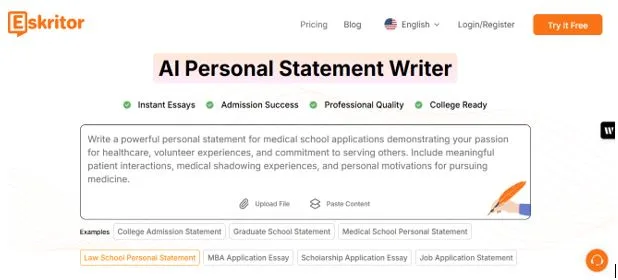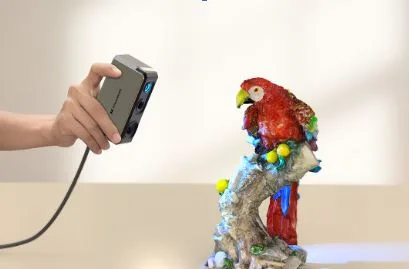The Invisible Co-Author: How AI Tools Are Transforming the Personal Statement
Why the Personal Statement Still Holds Power
In an age of resumes, automated screenings, and digital portfolios, one document remains deeply human: the personal statement. It’s where applicants explain not just what they’ve done, but why they’ve done it. Whether for college admissions, scholarships, or job applications, the personal statement allows candidates to express motivations, aspirations, and experiences in their own voice. Yet, despite its importance, this is one of the hardest documents to write.
The Rise of AI in Writing Support
That difficulty is exactly why artificial intelligence has entered the picture, not to replace the writer, but to assist them. Platforms like Eskritor, an AI-powered writing assistant that helps users generate and edit content across more than 40 languages, are being used to support the drafting, structuring, and refining of high-stakes documents. When it comes to something as personal and pressure-filled as a ai personal statement, tools like this provide a framework that reduces the paralysis of the blank page and builds writing momentum.
In Eskritor, users can explore different tones, receive feedback on clarity and grammar, and access writing templates designed specifically for personal and academic documents. While the content still needs to come from the individual, the platform helps sharpen the delivery, particularly useful for those writing in their second language or without access to one-on-one writing support.
Getting Unstuck: Structure Before Style
Most people don’t struggle with what they want to say; they struggle with how to say it. AI tools can offer an initial outline, suggesting where to introduce personal stories, explain transitions, or frame long-term goals. In the context of AI personal statements, this scaffolding can mean the difference between stalling out in paragraph one and finishing a full draft in an afternoon. More importantly, it gives writers a sense of direction, allowing them to focus on the substance of their story rather than the struggle of structuring it.
These tools also emphasize clarity over complexity. A well-structured statement doesn’t rely on poetic language or clever metaphors; it relies on coherence. AI-generated drafts or suggestions help eliminate filler and tighten phrasing. That means less time rereading and second-guessing and more time polishing the points that matter.
Personal Voice vs. Machine Guidance
Still, the presence of AI in personal writing invites an understandable question: how personal could a statement be if a machine had helped write it? The answer lies in how the tool is used. AI can suggest phrasing or improve sentence flow, but it can’t invent life stories, define someone’s values, or choose which memories to share. The core of any personal statement remains human. AI may refine the message, but it does not replace the message itself.
Used well, it becomes a kind of invisible co-author, suggesting edits, improving clarity, and keeping the structure on track, while the writer remains fully in charge of the narrative.
A Lifeline for Non-Native and Under-Resourced Writers
Not everyone has access to teachers, tutors, or professional editors. For students in underfunded schools or professionals applying internationally, AI writing tools offer a form of equity. They provide immediate feedback on grammar, help avoid awkward phrasing, and ensure clarity without requiring expert help.
They also lower the language barrier. Writing a personal statement in a second or third language can be especially intimidating, even when the story is strong. AI offers corrections without judgment, and tone adjustments that help a writer sound more natural in the target language, all without overriding the writer’s own experience or intent.
What Makes a Personal Statement Truly Stand Out
At the end of the day, a great personal statement isn’t defined by perfect grammar or poetic metaphors. It’s defined by specificity, clarity, and reflection. Applicants who can point to a moment of growth, show how it shaped their path, and express where they want to go next are the ones who stand out. AI can’t create those moments, but it can help illuminate them.
By cutting down the cognitive load of drafting and editing, AI allows writers to focus more energy on the deeper question: What do I really want to say? For many, that shift changes the writing process from something daunting into something empowering.
Ethical Use and the Line Between Help and Misuse
Of course, there’s a line that shouldn’t be crossed. Using AI to fabricate stories or exaggerate accomplishments is a misuse of the tool and undermines the purpose of the personal statement. Authenticity matters. Most AI writing platforms are intended to support honest writing, polishing what’s there, not creating what isn’t.
Used responsibly, AI is a writing mentor, not a ghostwriter. And that distinction is essential, especially in admissions or hiring processes where integrity is part of the evaluation.
A New Kind of Writing Companion
The future of writing will not be defined by humans or machines but by how well the two collaborate. In the case of personal statements, both the stakes and the potential are significant. AI tools are removing barriers, offering guidance, and making it easier for individuals to tell their stories with clarity and confidence.
For those navigating competitive applications without access to traditional writing support, AI is more than a shortcut. It is a second chance to write with purpose and precision, not to impress with rhetoric but to express with honesty and impact.
That shift is already happening across many platforms that integrate language support, tone correction, and real-time feedback. One such tool, Eskritor, quietly supports these goals by allowing writers to work across multiple languages, refine tone, and focus their message without losing authenticity. With this kind of support, AI is not replacing the writer but reinforcing the process and turning pressure into possibility.





